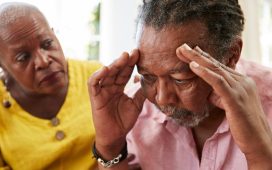Small benefits seen in older adults for pain intensity, anxiety, catastrophizing beliefs, self-efficacy
WEDNESDAY, May 9, 2018 (HealthDay News) — For older adults with chronic pain, psychological interventions have small benefits, including reducing pain and catastrophizing beliefs, according to a review published online May 7 in JAMA Internal Medicine.
Bahar Niknejad, M.D., from the Eastern Virginia Medical School in Norfolk, and colleagues extracted data from 22 studies with 2,608 participants to examine the efficacy of psychological interventions in older adults (60+ years) with chronic pain.
The researchers found that there were differences of standardized mean differences at post-treatment for pain intensity (P = 0.006), pain interference (P = 0.12), depressive symptoms (P = 0.14), anxiety (P = 0.09), catastrophizing beliefs (P = 0.046), self-efficacy (P = 0.02), physical function (P = 0.96), and physical health (P = 0.24). For pain only, there was evidence of effects persisting beyond the post-treatment assessment. Only mode of therapy (group versus individual) had a consistent effect in favor of group-based therapy in moderator analyses.
“Psychological interventions for the treatment of chronic pain in older adults have small benefits, including reducing pain and catastrophizing beliefs and improving pain self-efficacy for managing pain. These results were strongest when delivered using group-based approaches,” the authors write. “Research is needed to develop and test strategies that enhance the efficacy of psychological approaches and sustainability of treatment effects among older adults with chronic pain.”
One author disclosed financial ties to the pharmaceutical industry.
Copyright © 2018 HealthDay. All rights reserved.








